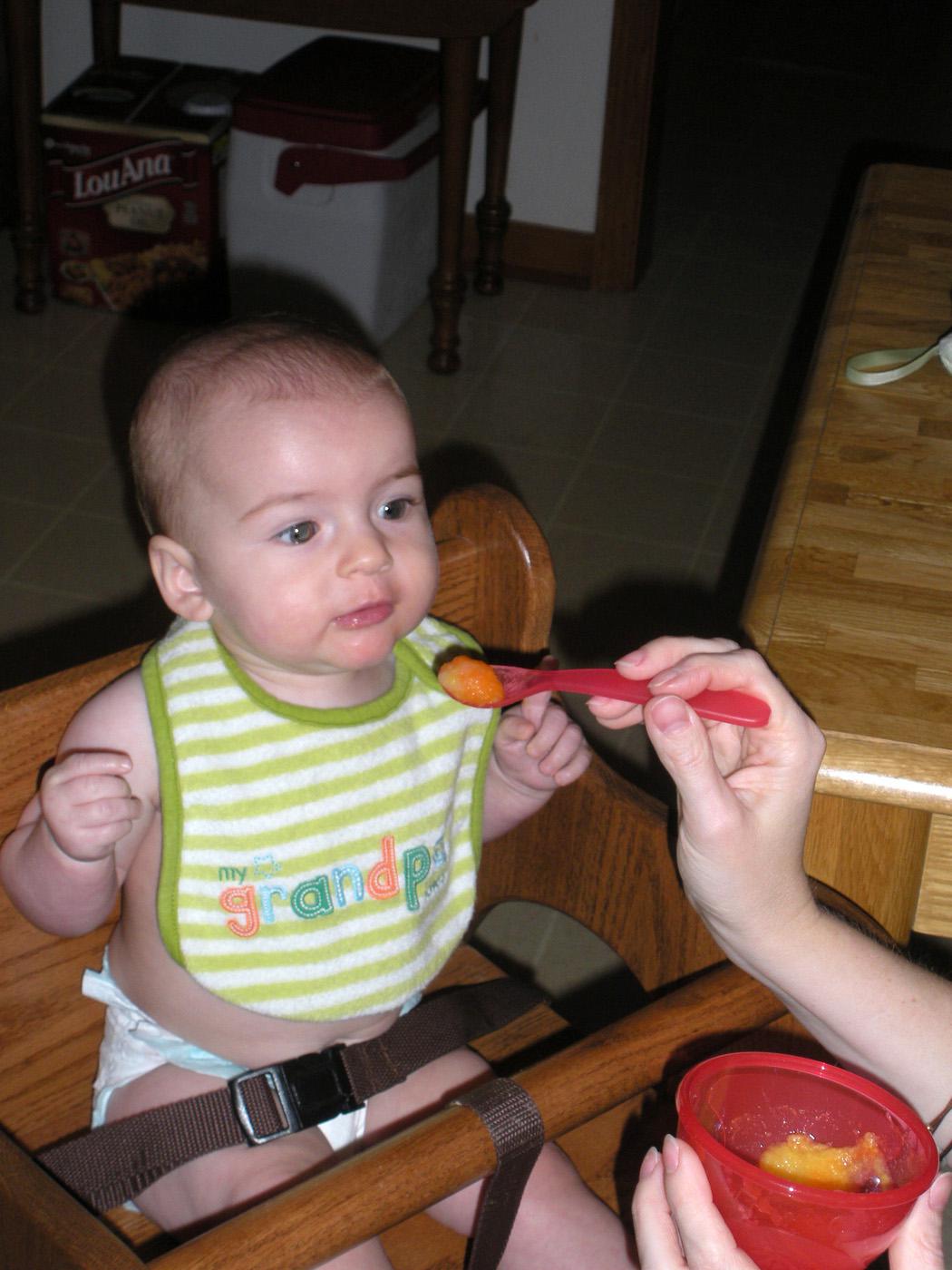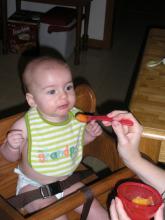Information Possibly Outdated
The information presented on this page was originally released on July 1, 2010. It may not be outdated, but please search our site for more current information. If you plan to quote or reference this information in a publication, please check with the Extension specialist or author before proceeding.
Homemade baby food benefits entire family
By Karen Templeton
MSU Ag Communications
MISSISSIPPI STATE -- Homemade baby food gives parents the advantage of controlling what goes into their babies’ sensitive stomachs and provides health benefits for the entire family.
“Providing babies with homemade baby food made of fresh fruits and vegetables can help instill taste and preference for these healthy food choices while avoiding preservatives and additives,” said Brent Fountain, human nutrition specialist with the Mississippi State University Extension Service. “Having these items on hand also provides additional opportunities for other family members to eat fruits and vegetables they might not normally eat.”
Fountain said that with children, “more is caught than taught,” meaning they learn by example.
“If babies smell fresh asparagus on their parents’ dinner plates, they are more likely to want to eat it when it is given to them,” he said. “They are consuming some of what parents are preparing for themselves, and this can help them be more enthusiastic about the food in front of them.”
Fountain said preparing homemade baby food is simpler than most people think.
“Parents can make food for their baby at the same time they are making their own meal,” Fountain said. “Steam some fresh vegetables for the family and put some aside to process into a smooth consistency for the baby. Breastmilk, formula or water can be used to help smooth and liquefy the pureed food.”
Parents can spend just a few hours every week or two to prepare and freeze vegetables and fruit to use later. Ice trays and silicone muffin tins are appropriate serving sizes for babies, and retailers also make special baby food freezer storage trays.
“I encourage parents to use plastic products that are labeled ‘BPA-free’ for storing baby food,” Fountain said. “The Food and Drug Administration raised some concerns about Bisphenol-A, or BPA, and in general, it is just good to err on the side of caution.”
Diane Tidwell, associate professor in the MSU Department of Food Science, Nutrition and Health Promotion, said parents need to take food safety measures seriously when preparing food for their infants.
“Parents should always use proper sanitation by using clean cooking utensils and preparing food on clean surfaces,” she said. “Also, the food shouldn’t sit out for very long. Keep the baby food refrigerated and throw it out if it doesn’t get eaten within four days of preparation. All frozen foods should be consumed within 24 hours after thawing and should not be refrozen.”
Tidwell said parents should not warm their infants’ food in the microwave.
“There is just no way to get the food evenly heated in the microwave. It can create little hot spots that can burn a baby’s mouth,” she said. “Steaming the fresh food before use is the best way to preserve the vitamins, and heating up in a saucepan is the safest way to get the food warm.”
Avoid giving babies under a year any highly allergenic ingredients, such as peanuts, cow’s milk, wheat, fish and soy, Tidwell said.
“Parents should not season baby food with salt or sugar; neither is healthy, and they are really unnecessary,” Tidwell said. “It is also important to never give a baby under 12 months of age honey, as it can lead to infant botulism.”
Fountain said solids can be introduced to children between ages 4 and 6 months, but they should not be the main source of calories.
“Up until a year old, breastmilk or formula should be the biggest nutrition source. We always like to remind parents that breastmilk is the gold standard, and feedings should not decrease significantly with the introduction of solids,” he said. “Start out slow and introduce vegetables first and then fruit.”
Expose babies to a variety of fresh seasonal produce such as sweet peas, green beans, asparagus, peaches, sweet potatoes, pears and bananas. Parents should introduce one food at a time and wait three to four days before trying something new to monitor for any allergic reactions, Fountain said.
“Families should use variety and have fun trying out new foods. Parents shouldn’t get discouraged if their baby rejects certain foods,” he said. “Often, a baby will turn down a food because of its consistency or temperature rather than its flavor. It is easy just to add more liquid or allow the food to cool to help make it more palatable.”
Fountain said giving babies the opportunity to sample fresh ingredients should be a fun experience.
“There is a sense of self-sufficiency in introducing a baby to fresh foods,” Fountain said. “It really gives parents the confidence to become excellent role models for helping their child learn to love and enjoy healthy foods.”




